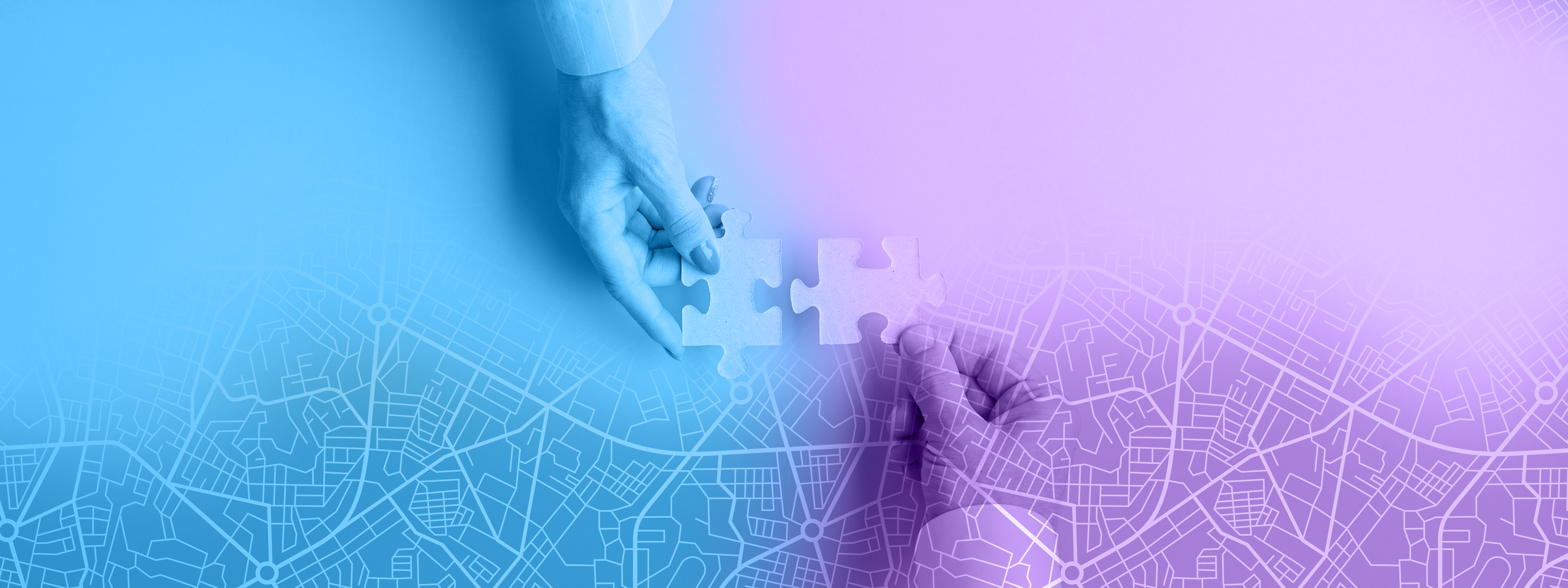IncluCities meets in Brussels
IncluCities consortium meeting
28, 29 March 2022, CEMR premises, Square du Meeus 1, Brussels
In this last Steering Committee of the IncluCities, the objective was to draw the final line for the project activities, take stock of what has been done so far and get specific training to boost the efficacy of the actions on the ground. The meeting was held in person at the CEMR premises, with sessions dedicated to internal affairs and to training sessions on gender issues and EU financing schemes for local authorities. During the afternoon of the 28th, the pairs had the chance to discuss the content and agenda of the third and last study visit within their mentoring scheme.
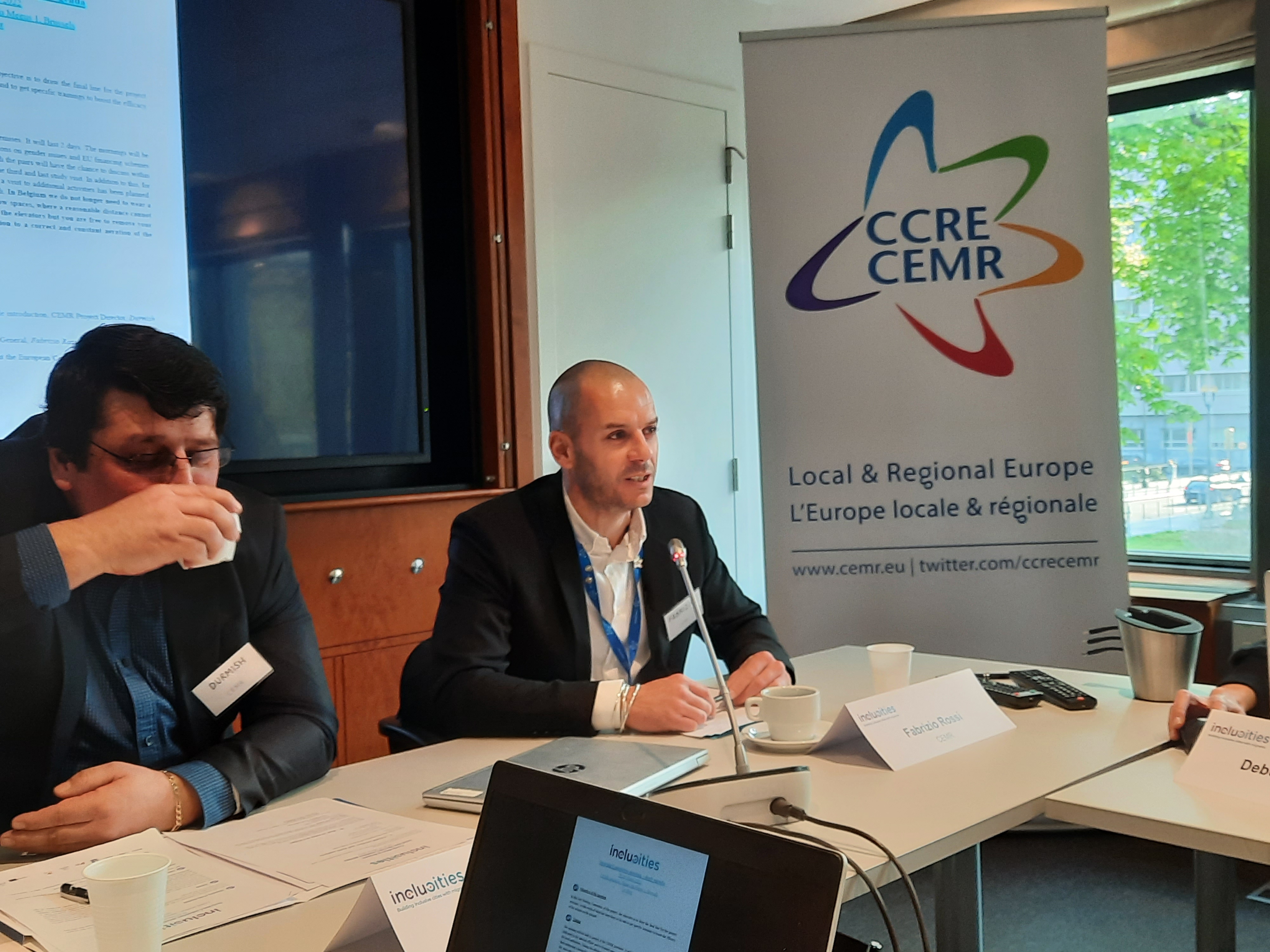
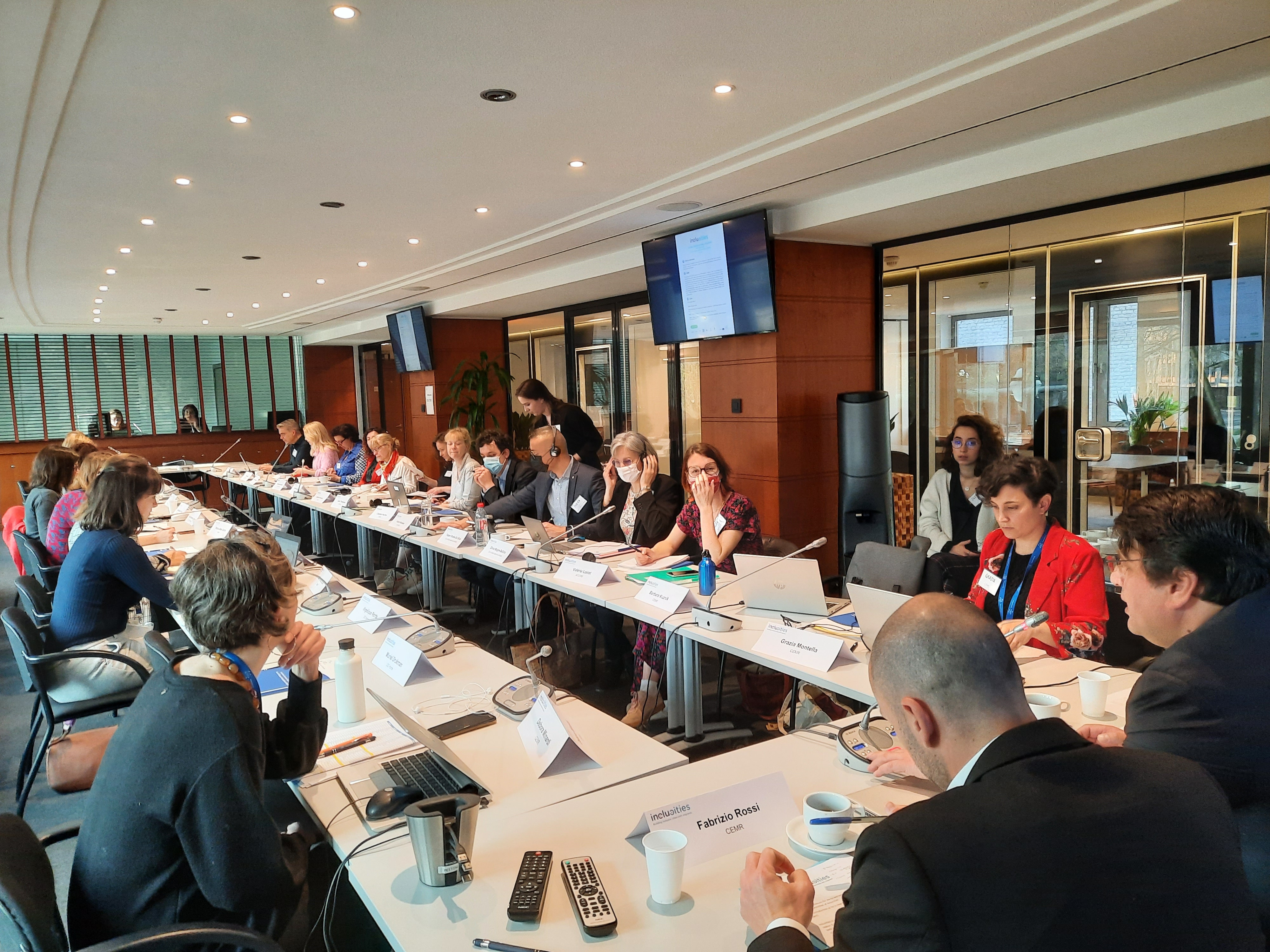
The CEMR Project Director Durmish Guri stressed in his welcome speech that CEMR is very proud of what the consortium of the IncluCities has done so far. However, added also it is now time to do a recap and see what is next.
For Fabrizio Rossi, the new CEMR’s Secretary-General, inclusion, even for him personally a fairly new, is a very important topic for local authorities. He mentioned that integration and inclusion are close to his heart, as he had the opportunity to work as a volunteer with unaccompanied minors in Belgium. That turned out to be a life-changing experience.
Rossi pointed out how the work of IncluCities is deeply connected with the priorities at the CEMR. “Inclucities is our flagship project on migration at the CEMR, and for this reason, it is even more important for the work we are called to do at both local and EU level. The project started at a time in which the 2015 crisis was the reference. Now the timing, the policies and the geographical origin of migrants have completely changed. The EU legislative framework of reference has changed for a more strategic vision of inclusion on the local ground. CEMR can offer a platform for valuable and precious exchanges of experience on this topic. Our associations and their members, the cities, already see this shift happening in front of their eyes. It is not about politics. It is about reality and with this new, unexpected wave of people coming from Ukraine, this suddenly became visible for all tiers of governments all around Europe. CEMR launched a new Task Force involving its members to disseminate good practices around this new emergency and have a common platform for updated knowledge sharing. With legislation, we build Europe; with projects, we build Europeans. With projects as IncluCities, we create the future and the way to face the next crisis”.
Starting the meeting, Project Coordinator Grazia Montella did a recap of the previous two years. See the Presentation of the IncluCities past achievements and next steps.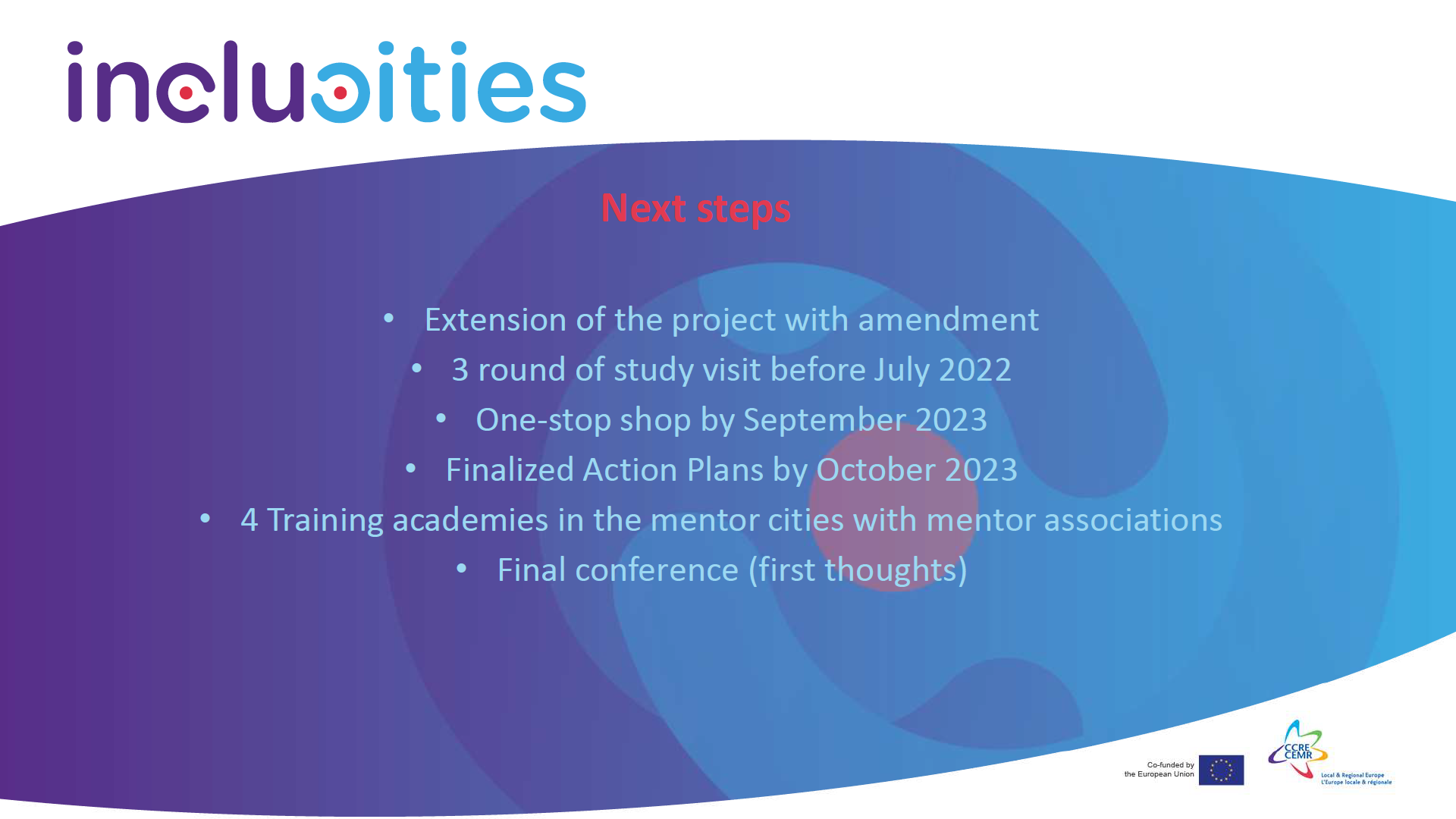
The main point revolves around the request for a no-cost extension of the project that CEMR will send to the European Commission. This has been the object of several discussions amongst the Consortium. All the partners formally agreed on the need for this month's extensionorder to correctly end the already planned activities in a proper way and to implement one additional awareness-raising storytelling campaign. The final product of this activity (photos and probably videos) will also enrich the final conference in March-April 2023. CEMR will officially launch the request to amend Annex 1 and 2 of the Grant Agreement later in April so as to be able to have the new deal starting before the summer break.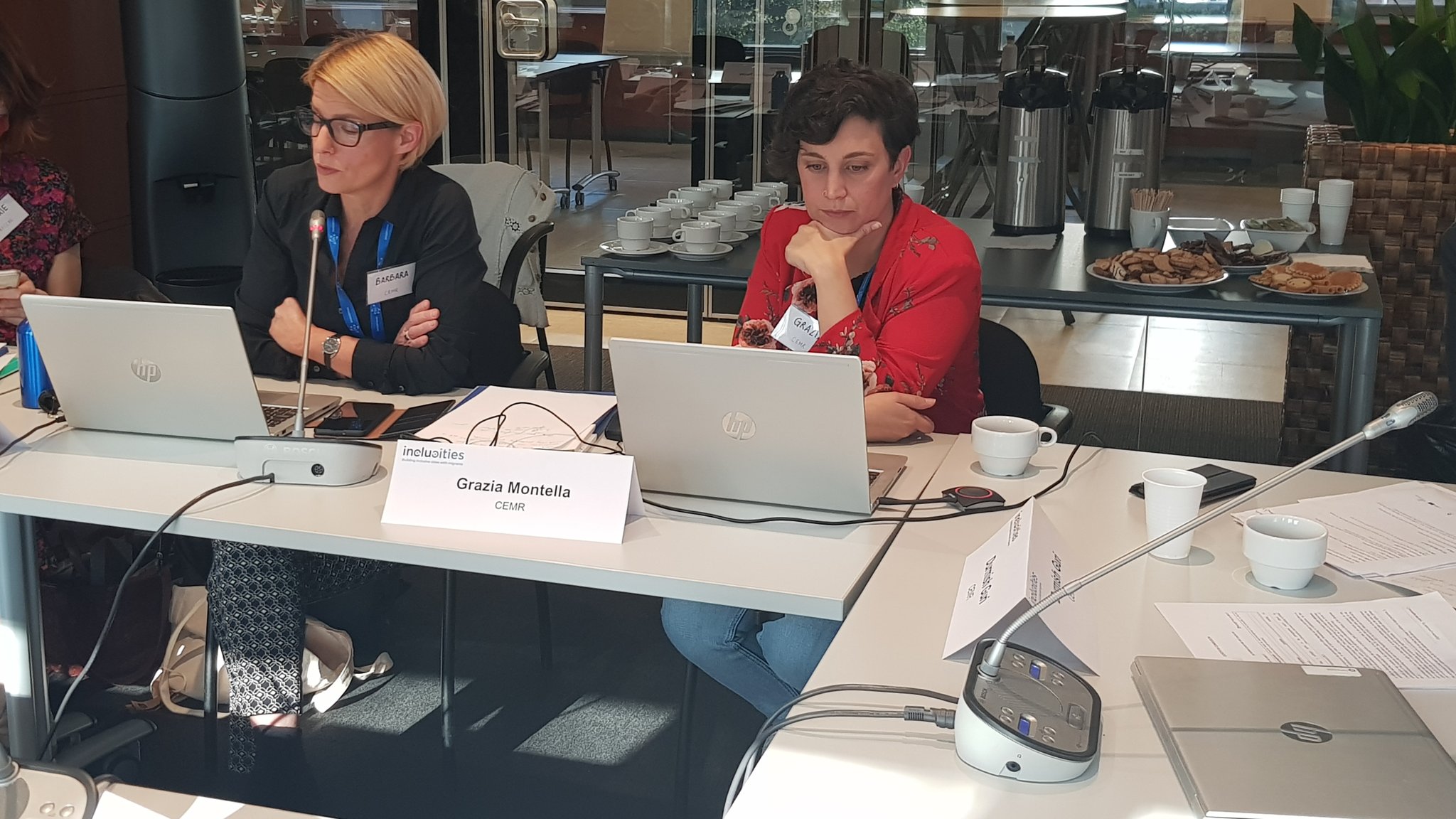 Barbara Kuznik, the communication officer, took the floor to complete the overview with the communication updates and next steps. The last four months have seen a further increase in the online presence and engagement of the general public towards the project and its activities. From a communications point of view, the series of Interviews is one of the strongest tools we have within IncluCities to showcase the political support for the project in cities. The recent interview with the mayor of Saint Jean de la Ruelle Christophe Chaillou will be published in April; before summer, we plan to talk with the representative of the Jelgava City Council in fall, Schaerbeek will have its turn, and in February/March 2023 we aim to finish the series with the interview presenting the political representative from the City of Brussels.
Barbara Kuznik, the communication officer, took the floor to complete the overview with the communication updates and next steps. The last four months have seen a further increase in the online presence and engagement of the general public towards the project and its activities. From a communications point of view, the series of Interviews is one of the strongest tools we have within IncluCities to showcase the political support for the project in cities. The recent interview with the mayor of Saint Jean de la Ruelle Christophe Chaillou will be published in April; before summer, we plan to talk with the representative of the Jelgava City Council in fall, Schaerbeek will have its turn, and in February/March 2023 we aim to finish the series with the interview presenting the political representative from the City of Brussels.
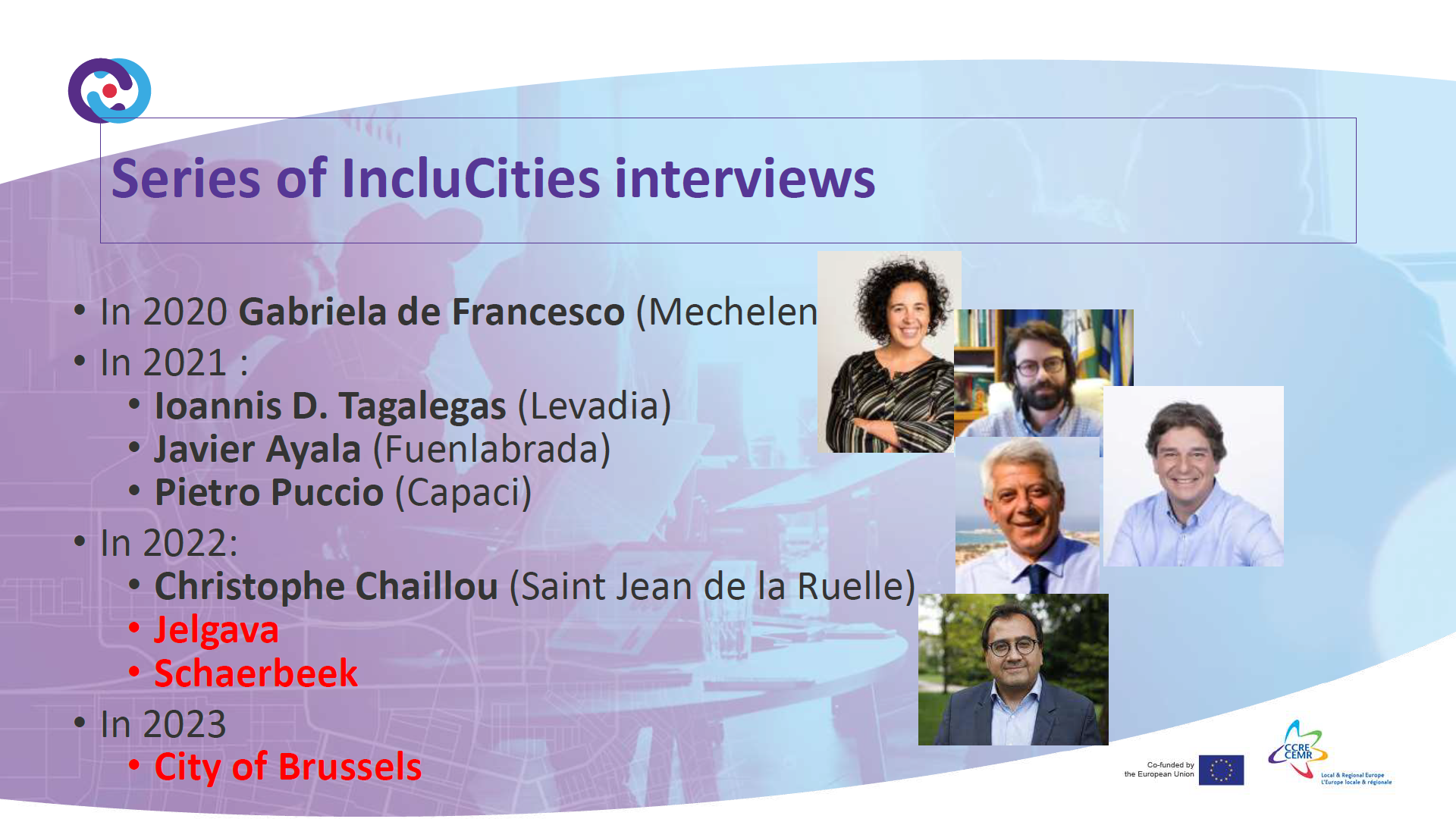
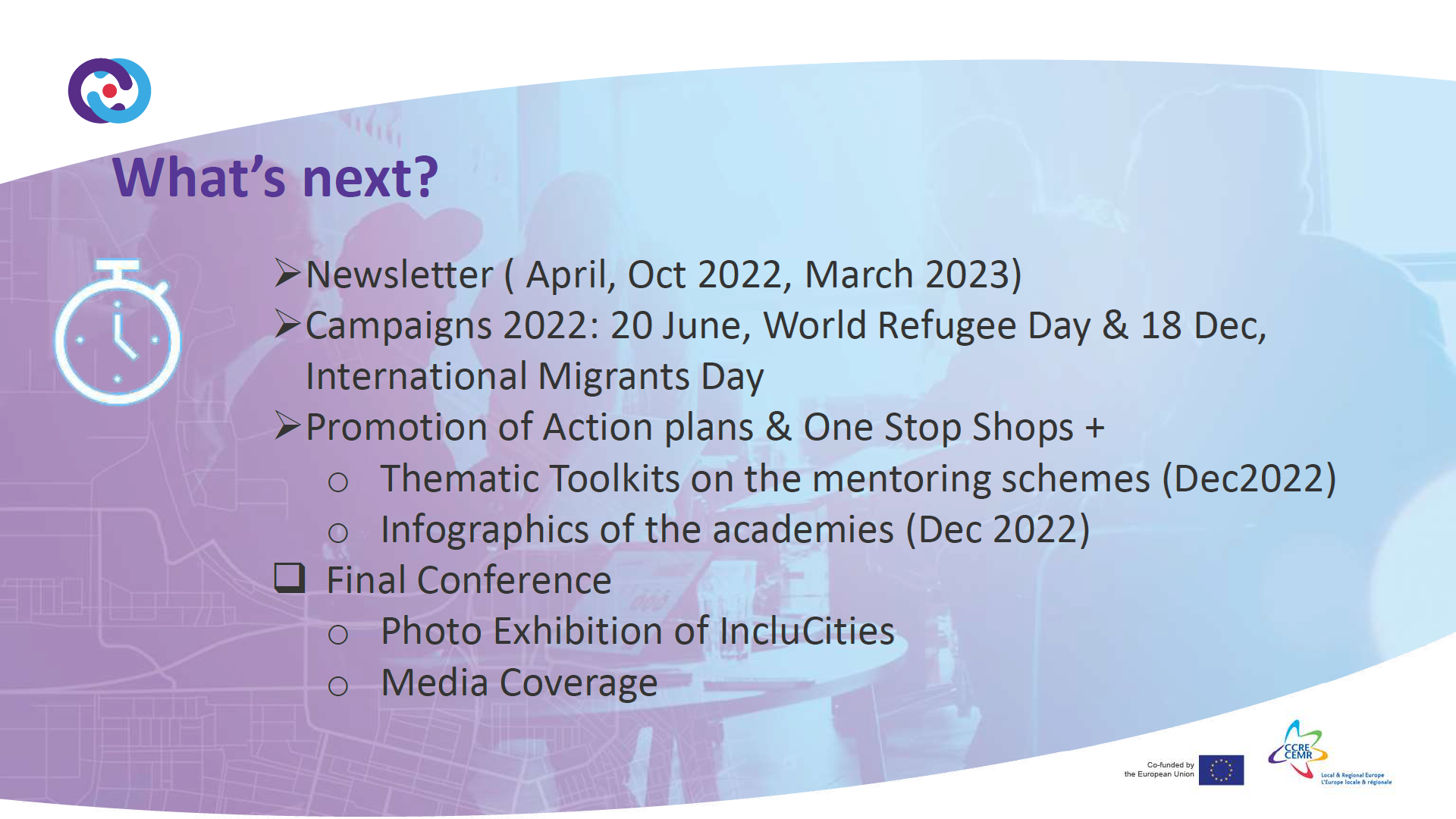
The additional activity of the project will be a raising awareness campaign declined through a photo exhibition and a storytelling session with the people on the ground. The city of Mechelen already did a similar project and is available to give a short training of one hour to the rest of the Consortium on the 13th of April. In the meantime, CEMR will also organise a series of webinars focused on the current refugee crisis linked to the war in Ukraine.
Dirk Gebhardt from Migration Work did the last intervention of the morning. He went through the final year of implementation of the methodology, analysing the progress and challenges encountered. He displayed the effort made by the entire Consortium to overcome the difficulties due to the impossibility to see each other on the ground and gave comments and suggestions on how to improve the work done so far. See his presentation.
The meeting continued with a special roundtable session to exchange about the current situation the different partners of the project are experiencing in their territories linked with the inflow of refugees from Ukraine. In general, all are experiencing a big wave of solidarity. Associations and cities are issuing statements of political support to Ukraine and are condemning Russian aggression. In some cases, cities coordinate humanitarian aid and help other peer cities across Europe that are more affected. Cities such as Mechelen and the City of Brussels are already welcoming refugees. They experience an increased number in the arrivals of Ukrainian people to their BAPA office because of the TPD (Temporary Protection Directive) and the special status they can ask for. They help them with social follow-up, mostly focused on social aid and housing. There is a dedicated website of the city where citizens can express their availability to host someone from Ukraine in their house. Mechelen put in place two task forces: one on infrastructure and the other on social affairs. A general steering committee, including political representation, keeps an overview and coordinates the different ways to accommodate refugees (rooms, emergency accommodations, temporary empty social houses in the process of being renovated). For the social framing, they have adjusted their “buddy program”, and now they are welcoming people to become buddies with new refugees and show them the city and the culture.
Latvian partners have more concrete stories to tell - formerly with the lowest percentage of refugees, Latvia is recently becoming one of the countries more affected by the war in Ukraine. Due to exceeded capacities in Riga, they started to relocate refugees from Ukraine to other cities and Jelgava as one of the closest bigger towns. One problem is that they don’t know exactly how many Ukrainians are in their territory, as not all of them register when they arrive. For the city with less experience in welcoming refugees, Jelgava had to act quickly and with lots of coordination. The city created an emergency phone number 24/7, which represents the first point of contact and registration. The information is transferred to the coordinator of the social service centre, and it is shared with the entire team that manages the actions related to education and legal status. After the first weeks of solidarity and willingness of citizens to host the refugees, they have seen a change in public sentiment and realised that private accommodations are only temporary solutions. People can host refugees for a shorter period of time because this act of solidarity also applies additional costs the majority in Jelgava can't afford. They are facing new challenges they will have to tackle with the collaboration of all levels of government.
Angelique Petrits from DG Home listened very carefully to the stories from the ground and gave participants of the steering committee also the European Commission perspective. The first thing the EC did was the activation of the Temporary Protection Directive. The main issue they experienced with Ukrainians coming to the EU is that they are allowed to come without a visa for 90 days. However, with the TPD activated, they can prolong their stay for one year (renewable twice for six months) and have access to education, housing and employment services. The Commission also published concrete guidelines to Member States, to instruct them through the implementation of the directive while giving them the main pillars in the integration and inclusion process. Almost 4 million refugees (state on 28 March) have come to the EU, the composition of the inflow is mainly women and children. Therefore, the focus is very much on adapting the services to this target population. We need to pay attention to avoid trafficking in the current situation and, at the same time, give enough information and specific services linked to health care and labour market integration for women. On a side note, it is worth mentioning that, unfortunately, Ukraine has quite a low rate of vaccination against COVID-19, so they are also implementing a vaccination campaign for those arriving in the EU. Concerning the housing service, a large majority of incoming people have relatives or accommodation in one of the Member States and this gives a natural spread of the inflow throughout Europe.
The Commission started a Solidarity Platform to support the local and regional level authorities that are at the frontline of integration.
With the Inclusion Partnership of the Urban Agenda, EC is implementing special sessions about the situation on the local and regional level in Europe with the Ukrainian refugees, inviting also cities and other stakeholders that are not members of the platform as they think it is essential at this point to stay tuned and share information.
The mentoring pairs met in the afternoon to organise the third study visit in the mentee city. Some of them also have the opportunity to visit their mentor cities in Belgium with an additional visit to Mechelen, Schaerbeek and Brussels specific activities.
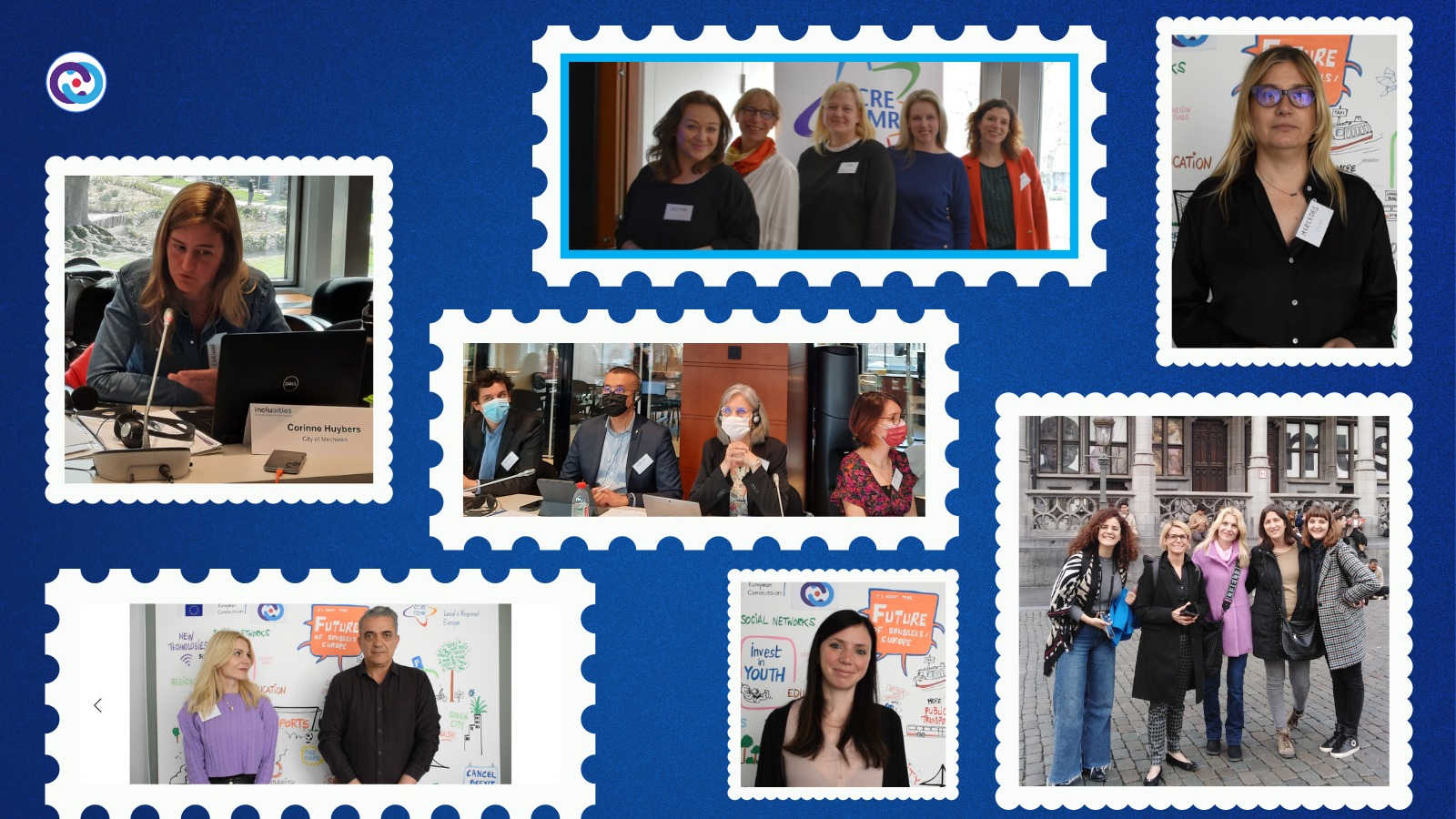
The second day of the Steering Committee sees the cities and the associations be split into two groups.
Associations took part in a special financial session dedicated to the shift of the budget, the additional activities and the agreement on these changes in order to submit the amendment of the project. Debora Minardi, Inclucities Finance Officer, moderated the meeting, supported by Durmish Guri and Maria Grazia Montella.
On the other side, the cities are involved in a training session organised especially for them around the topic of gender equality. Jaimie Just, Gender and Diversity Adviser at CEMR, the session (find her presentation here). The workshop's main objective was to provide knowledge and tools for municipalities to apply in their daily lives and give them ideas to go further. The idea was to engage in a dynamic through thought-provoking exercises and discussions. Why gender equality and local governments?
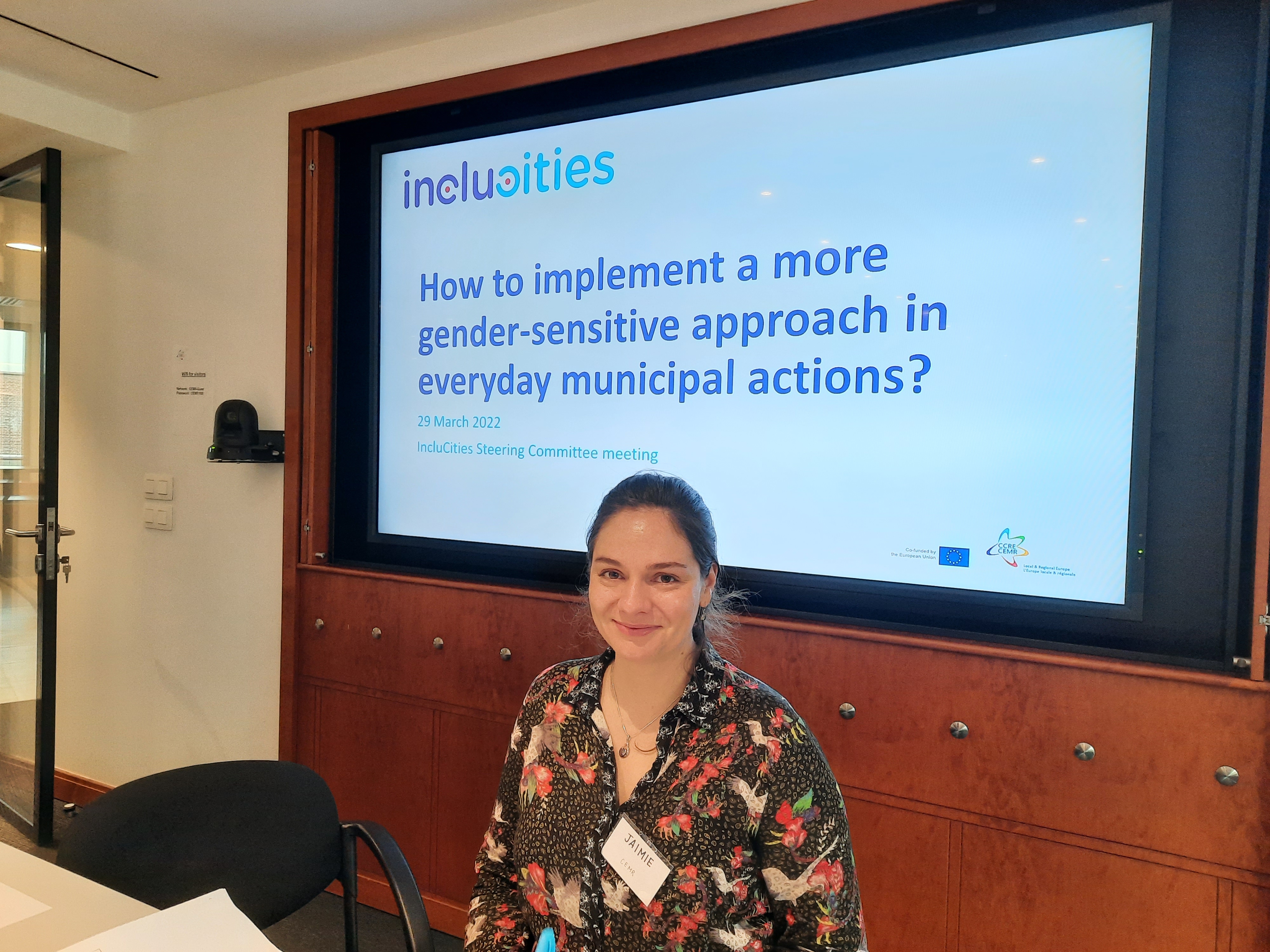
Iulia Barbu from DG HOME presented the recent AMIF funding scheme as a final session. The most important information was that AMIF call would be published with delay due to the current Ukrainian crisis. In any way, cities and associations should take a look at the presentation and get ready for the call in case they want to apply for the funding related to integration and inclusion at the local level.

